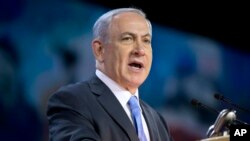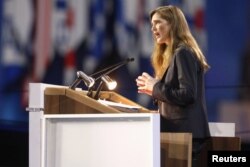Israeli Prime Minister Benjamin Netanyahu says his country and the United States agree on the need to keep Iran from getting nuclear weapons, but disagree on how to achieve that goal.
In a Monday morning speech in Washington to the American Israeli Public Affairs Committee (AIPAC), Netanyahu said the pro-Israeli group's turnout of 16,000 at the annual conference shows strong commitment to the relationship between the two countries. "You're here to tell the world that our alliance is stronger than ever," he said, predicting "it's going to get even stronger in the coming years."
He also expressed "boundless gratitude" to both parties in the U.S. Congress for their long-term support of the Jewish state.
Netanyahu's remarks came one day ahead of a scheduled address to the U.S. Congress that has generated controversy. Republican House Speaker John Boehner had invited the Israeli leader without first consulting with the White House, considered a breach of protocol. Netanyahu's acceptance has highlighted the strain in his relationship with U.S. President Barack Obama.
"Never has so much been written about a speech that has not been given," Netanyahu told AIPAC conferees. He said accepting the congressional invitation was misconstrued as a slap at Obama and the executive office.
"I have great respect for both," the prime minister said, adding he appreciated the president's efforts on security cooperation, intelligence-sharing and support of the United Nations.
Netanyahu said his congressional address will focus on U.S. and other world powers' negotations with Iran "that could threaten the future of Israel."
He'll argue against letting Iran achieve its goal of obtaining nuclear weapons, he said. Giving nuclear arms to Iran, which he said already is busy sponsoring terrorism, would make that country even more menacing.
"The days when the Jewish people are passive in the face of threats to annihilate us – those days are over," Netanyahu said to sustained applause.
His intention in addressing Congress also is to sustain the United States' bipartisan support for Israel, the prime minister said. "Working together has made Israel stronger. Working together has made our alliance stronger.... The last thing that I would want is for Israel to become a partisan issue."
Acknowledges disputes
Netanyahu said that, in his nine years as prime minister, he has not gone a day without thinking about his country's survival. He has a moral obligation to speak up about threats while there's still time to address them, he said.
He also said that Israel, since its 1948 founding, sometimes has had "serious disagreements" with the United States, its chief ally.
Disagreement with the United States grows out of different perspectives, he said, because Washington worries about security, while Israel must worry about survival.
U.S. Secretary of State John Kerry has sought to downplay any rift. In an appearance Monday before the U.N. Human Rights Council in Geneva, he expressed continued support for Israel, faulting what he called the council's "obsession with Israel."
Earlier at Monday's AIPAC conference, the U.S. ambassador to the United Nations also affirmed strong support for Israel. Samantha Power reiterated the president's commitment to Israel and hope for a nuclear accord.
"We believe firmly that Israel's security and the U.S-Israel partnership transcends politics, and it always will,'' Power said.
Kerry, Iranian counterpart confer
Kerry on Monday also resumed talks with Iranian Foreign Minister Javad Zarif over a deal that would grant Iran relief from crippling economic sanctions in return for restraining Tehran’s nuclear program. Iran’s critics say its nuclear efforts are intended to develop nuclear weapons, which Tehran denies. It says its nuclear goals involve peaceful purposes such as producing electricity.
The U.S. and five other world powers – including Britain, China, France, Germany and Russia – face a June 30 deadline for a deal that cuts Iran's uranium enrichment program in exchange for lifting sanctions. The two sides want an interim framework agreement by the end of this month.
Representatives involved in the talks have sought to keep any details of the negotiations private.
Poll results
Netanyahu's invitation by Republicans in Congress has divided Americans. Nearly half (48 percent) surveyed said lawmakers should not have invited Netanyahu to speak without notifying the White House, according to a poll by NBC News and The Wall Street Journal. Thirty percent of respondents thought the invitation was acceptable, while 22 percent were unsure.
In the meantime, more talks got under way Monday on nuclear issues between Secretary Kerry and Iranian Foreign Minister Javad Zarif. The talks offer Iran relief from sanctions that have damaged its economy in return for restraining Tehran’s nuclear program. Iran’s critics say its nuclear efforts are intended to develop nuclear weapons, while Tehran says they are aimed at peaceful purposes like making electricity.







